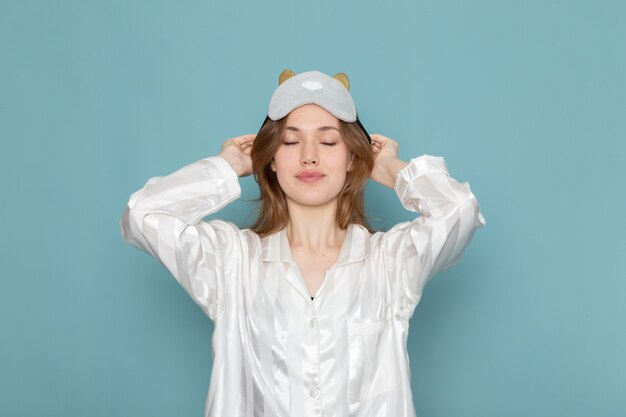
Difficulty falling or staying asleep, commonly known as insomnia, can leave people struggling with restless nights. Insomnia includes issues like trouble drifting off to sleep, waking up in the middle of the night, waking too early in the morning, or feeling unrefreshed after sleep. However, a breakthrough solution called cooling caps has emerged as a promising way to tackle insomnia effectively.
Sometimes, insomnia is a primary condition—meaning it happens without other health problems—for at least a month. But often, it develops alongside issues like medical conditions, mental health challenges, or side effects of medications. Reports from the American Academy of Sleep Medicine reveal that over 10% of U.S. adults experience chronic insomnia for more than a month. Many others deal with insomnia as a secondary condition stemming from other problems.
People often turn to sleeping pills for relief, but these are only a temporary fix. Over time, these medications can lose effectiveness. They also come with a range of potential side effects, such as drowsiness, trouble maintaining balance, appetite changes, dry mouth, and even digestive issues, adding more stress to the challenge of sleepless nights.
Cognitive Behavioral Therapy (CBT) is another approach to managing insomnia. It works by helping people eliminate negative thoughts and habits that contribute to sleep troubles. While effective, CBT requires consistency and time before significant results can be seen. For those with worsening primary insomnia, immediate solutions are often needed. That’s where cooling caps offer a unique advantage.
Cooling caps work by lowering the temperature of the frontal lobe—the part of the brain associated with active thinking and reasoning. This cooling effect helps reduce brain activity at night, allowing for a calm and peaceful state conducive to sleep. First announced at the 25th Annual Meeting of the Associated Sleep Societies in 2011, cooling caps have shown significant potential to relieve insomnia symptoms.
For individuals with insomnia, the brain tends to be more active at night than it should be, generating excessive heat and making sleep nearly impossible. Cooling caps regulate the brain’s temperature by using water circulation to cool brain tissues and muscles. This lowers hyperactivity in the brain, enabling insomniacs to fall asleep more easily and maintain restful sleep.
Studies conducted at the University of Pittsburgh School of Medicine demonstrated the effectiveness of cooling caps. In one study, 12 insomniacs and 12 healthy sleepers wore cooling caps at night. Remarkably, the insomniacs were able to fall asleep in just 13 minutes—nearly as quickly as the healthy sleepers, who needed 16 minutes. The cooling caps also significantly increased the insomniacs’ sleep duration. This happens because the cooling reduces the metabolic rate of the brain, which is unusually high in people with insomnia.
Further research indicated that cooler cap settings yielded better results, suggesting that lowering brain temperature effectively supports sleep. Cooling caps also mimic the effects of melatonin, a common sleep aid, by helping to regulate brain and body temperature at night.
Beyond innovative solutions like cooling caps, there are several practical lifestyle changes that can aid in managing insomnia:
1. **Use Your Bed Only for Sleeping and Intimacy**
Avoid activities like working, watching TV, or using phones in bed. These habits can make your brain associate your bed with being alert rather than restful.
2. **Create a Comfortable Sleeping Environment**
Ensure your bedroom is quiet, dark, and cool, with comfortable bedding. A calm environment can make it easier for your body to relax.
3. **Limit Daytime Naps**
Long or frequent naps can interfere with nighttime sleep. Avoid naps to ensure consistent sleep at night.
4. **Stick to a Sleep Schedule**
Go to bed and wake up at the same time every day, even on weekends. Consistency helps regulate your internal clock.
5. **Avoid Alcohol and Stimulants Before Bed**
Alcohol may initially make you drowsy but often disrupts sleep later. Additionally, limit caffeine and nicotine consumption in the evening, as they can keep you awake.
6. **Finish Eating Well Before Bedtime**
Avoid meals or beverages right before bed to prevent digestive activity or bathroom trips from disrupting your sleep.
7. **Manage Stress**
Stress and overthinking are major insomnia triggers. Practice relaxation techniques or mindfulness exercises to keep your mind calm.
8. **Incorporate Regular Exercise**
Physical activity can improve sleep quality, but avoid exercising close to bedtime as it may raise your energy levels when you need to wind down.
Insomnia, if ignored, can lead to serious health issues over time. While lifestyle changes and therapies are essential, cooling caps represent an exciting new option for individuals who haven’t found relief through other methods. With continued research, they might become a game-changing solution for those battling sleepless nights.